- Home
- Johnny D. Boggs
Hard Winter
Hard Winter Read online
HARD WINTER
A Western Story
HARD WINTER
A Western Story
BY
JOHNNY D. BOGGS
SKYHORSE PUBLISHING
First Skyhorse Publishing edition published 2013 by arrangement with Golden West Literary Agency
Copyright © 2009, 2013 by Johnny D. Boggs.
All Rights Reserved. No part of this book may be reproduced in any manner without the express written consent of the publisher, except in the case of brief excerpts in critical reviews or articles. All inquiries should be addressed to Skyhorse Publishing, 307 West 36th Street, 11th Floor, New York, NY 10018.
Skyhorse Publishing books may be purchased in bulk at special discounts for sales promotion, corporate gifts, fund-raising, or educational purposes. Special editions can also be created to specifications. For details, contact the Special Sales Department, Skyhorse Publishing, 307 West 36th Street, 11th Floor, New York, NY 10018 or [email protected].
Skyhorse® and Skyhorse Publishing® are registered trademarks of Skyhorse Publishing, Inc.®, a Delaware corporation.
Visit our website at www.skyhorsepublishing.com.
10 9 8 7 6 5 4 3 2 1
Library of Congress Cataloging-in-Publication Data is available on file.
ISBN: 978-1-62087-806-4
Printed in the United States of America
For Ol’ Max Evans
Pardner, I can never thank you enough.
Spring, 1920
A little bird told John Burroughs, the
naturalist, it’s to
be a long, hard winter.
—Kansas City Star, December 13, 1919
Chapter One
Weather and creaking joints permitting, Jim Hawkins could be found every weekend—Saturdays while his wife, daughter, and grandson did the shopping, and Sundays while his wife, daughter, and grandson did their churching—sitting in that rocker right outside the Manix Store in Augusta, whittling and spitting, spitting and whittling. “Holding court,” Big Clem Ellis often called it, but for a king, Jim Hawkins didn’t say much.
To the children playing in the streets or on the boardwalk, and even to some younger men, Jim Hawkins sure looked old enough to have been a king, one from those ancient times of Arthur, Richard, George, or Louis. Few knew what age Jim Hawkins might own up to, but Big Clem Ellis said he’d heard that Jim Hawkins was right at fifty years old, which might explain why his hair was so gray, face so sun-beaten underneath that battered gray hat, knuckles so misshapen, or why he needed a scarred hickory cane to push himself out of that rocking chair, especially when it got cold, and it got bitter cold in Augusta. Especially the past winter. Folks figured the Chinooks would never get there, and the warm winds didn’t arrive in time for many farmers. Come spring, homesteaders by the score gave up, saying good bye to their mortgages, the unforgiving wind, and forlorn dreams. Bankers would be getting many farms, providing their banks hadn’t died, too.
So, there sat Jim Hawkins in front of the Manix Store, rocking and spitting, spitting and whittling, paying little attention to mules pulling buckboards through the mud and muck of Main Street one Saturday afternoon in April. He sent a splash of tobacco juice into a rusty coffee can resting to his right, and never once missed, while other men gathered about as their wives shopped and their children played.
“Good to see you, Jim,” Harry Carter said as he settled onto the wooden banister a few feet from where Henry Lancaster, Jim’s eleven-year-old grandson, shot marbles with Big Clem Ellis and Hans Junger. “How’d you-all make out this winter?”
“Passable.” Jim Hawkins spit.
“Hit forty below in December,” Bob Kirk said, “at my place. Coldest I’ve ever seen it.”
“Oh, winter wouldn’t have been too bad,” Lou Cator said with a chuckle, “if it hadn’t been for the weather.”
Everyone laughed at that, except Jim Hawkins, and some pale woman who happened to be riding past the mercantile with her husband in a beat-up old wagon. The wagon bed hauled a sixtypound moldboard plow, a trunk, and a small coffin. The woman just stared, her eyes as dead as the rest of her face, and she shivered, like she’d never get warm again, and pulled a blanket over her shoulders, not blinking, not really understanding, then turning away. Nobody noticed her except Jim Hawkins and his grandson. All Jim Hawkins did was run his thumb along the edge of his knife for about a minute, then went to work on the stick. Nagged by Big Clem Ellis, young Henry Lancaster stopped staring, and went back to marbles.
“It’s the government’s fault,” Bob Kirk said.
“Usually is,” said Pork Ellis, Big Clem’s father.
“You blame the government for it being forty below?” Lou Cator asked lightly.
“No,” Bob Kirk snapped. “For all this misery. For getting us in that war. Bringing all them fool sodbusters to Montana, telling them to grow wheat, grow wheat, grow wheat. Grow it for the Army, for those starving folks in Europe. Setting the price so it wouldn’t drop below two dollars a bushel. Them greedy farmers ruined a lot of good land hereabouts. They’re worser than sheepmen.”
“Watch it,” said Pork Ellis. “I am a sheepman.”
“You know what I mean, Pork,” Bob went on. “Stock growers like us, we wouldn’t ever ruin a land like farmers. But I don’t begrudge them none. It’s the government.”
“First come the war, then the influenza,” said J.R. Junger, his accent thick. “Then the winter. Now this misery. It is the end of the world.”
“Worst winter that ever struck,” Pork Ellis agreed, “iffen you ask me.”
“Hard winter,” Harry Carter said, “and more hard times coming.”
Camdan Gow rode up on a red Indian Big Twin with the white wheels—well, once, maybe, they had been white. For the past two or three years, he had been sputtering around on that motorcycle, which he had special ordered from Massachusetts. Briefly the children abandoned the marbles to study, enviously, Gow’s fancy bike, the only motorized vehicle anyone had seen between Helena and Great Falls. Gow, who owned a small ranch just north of Choteau, didn’t climb down yet, listening to the conversation and nodding a polite greeting in Jim Hawkins’s direction.
“I feel sorry for some of them sodbusters,” said Lou Cator, no longer smiling.
“I feel sorry for me,” Pork Ellis said. “I lost thirty percent of my flock.”
“Maybe Governor Stewart can help,” Harry Carter offered.
“Well, I ain’t buying some bond to build roads,” Bob Kirk said, “not to provide relief to a bunch of poor, ignorant . . . what was it they used to call those Texas cattlemen who drove up here?” He was looking to Jim Hawkins for help, but it was Camdan Gow who answered.
“Steer men.” Gow stepped off his motorcycle. “And the old-timers were called she-stockmen.”
“That ain’t what I was thinking,” Bob Kirk said.
“Yeah,” quipped Lou Cator, “but we got children present.”
“Well,” Bob Kirk said, “if that bond’s the best thing to come out of Helena. . . . .” He shook his head, letting the words die.
“Nobody can help them,” Gow said as he made his way to the boardwalk.
“What brings you south, Camdan?” Pork Ellis asked.
“Wanted to see how bad things are,” the Scotsman answered.
“What’s your verdict?” Harry Carter asked him.
Shaking his head, Gow fished a pipe from the pocket of his jacket.
“Worst winter I can recall,” Lou Cator said again.
“Me, too,” agreed Harry Carter.
“How about you, Jim?” Pork Ellis asked. “You ever seen a winter that bad?”
The rocking stopped, and Jim Hawkins tossed his slim stick into the mud, folded his knife, and fou
nd the handle of the hickory cane. The court stared at him, waiting, and he pulled himself to his feet, and looked through the open doors of the Manix Store. As if summoned, Hawkins’s wife and daughter filed out.
“Just one,” Jim Hawkins answered at last. “Eighteen Eighty-Six, ’Eighty-Seven.” Taking a brown-wrapped package from Mrs. Hawkins, he followed his family down the steps, into the mud, and to his spring wagon.
Harry Carter whistled. “You was here for that one, Jim? That was before my time.”
“That was before Augusta,” Lou Cator said, laughing.
“Come along, Henry,” Jim Hawkins’s wife ordered, so the boy quickly put marbles in the pocket of his overalls, and joined the family.
“I have heard the stories,” J.R. Junger said.
“Stories that make my bones ache.” Harry Carter shook his head.
“Oh,” Bob Kirk said, “it couldn’t have been as bad as this one. It was snowing at my place on the Eighth of October.”
“I dunno,” Pork Ellis said.
Only Camdan Gow had left the boardwalk, helping the women with their groceries and into the spring wagon before Jim Hawkins snapped the reins, and rubbed his knee as the wagon moved down Main Street.
“How bad was that winter, Jim?” Bob Kirk called out.
“Hard,” he answered.
“Worse than this past winter?”
“Harder.” He spit into the mud, and flicked the reins eagerly, turning the wagon around in the wide street, heading west, taking his family back toward the Sun River. He stared ahead, eyes pained, remembering something that rose from his soul, thoughts he had tried to forget over the years, memories that strengthened with the stiffness of joints, the whiteness of the hardest of winters, and the bitterest of winds.
Bob Kirk took off his hat to scratch his head. “Well, I don’t believe it could have been that bad. Forty below it was, at my place. And that was in early December. Couldn’t have been worse than this winter.”
“Could have been.” Camdan Gow settled into the warm rocker. “And was.”
Lou Cator grinned. “Old Jim Hawkins don’t say much.”
“He said enough,” Camdan Gow said.
* * * * *
He said enough.
Jim Hawkins said hardly anything. Ever. That’s how Henry Lancaster felt. Sure, he’d hear his grandfather talking to his grandmother fairly often—seemed to be carrying on quite the conversation every now and then—but Jim Hawkins hardly said anything to anybody else.
It was like that on Sunday morning when Henry Lancaster came inside after doing his chores and washing up, finding his mother and grandmother in their Sunday best at the table with Jim Hawkins, who sat quietly making sandwiches of biscuits and bacon for the rest of the day. This Sunday, he was making more sandwiches than usual. Like he had a bunkhouse full of cowhands to feed.
“Eat up,” Henry’s mother said. “Else we’ll be late for preaching.”
“Leave the boy with me.”
Hearing his grandfather’s words, Henry almost choked on crisp bacon.
“It’s Sunday,” Prudence Lancaster reminded her father.
“Need to do some riding.” He started sticking biscuit and bacon sandwiches in the pockets of his Mackinaw.
“It’s the Lord’s day,” Lainie Hawkins said. “He needs to be in church.”
“I ain’t going to turn Henry into no infidel,” Jim Hawkins said. “Just ride up to the cañon, see things.”
“The cañon!” Prudence shouted. “That’ll take you two, three days. Henry’ll miss school.”
“He can miss a day or two, same as he can miss one sermon. Ain’t like the boy hears nothing that preacher says anyway. He’s asleep most the time.”
Henry’s face flushed. So did his grandmother’s.
“How would you know, Jim Hawkins?” Lainie snapped.
“You don’t need to be riding a horse,” Prudence said. “Not that far.”
“One reason I need the boy to tag along with me.”
“There’s nothing up there,” Prudence said. “There’s no cattle . . . not of yours, anyhow.”
“There’s memories.”
Prudence Lancaster let out a sigh of exasperation, and she was about to argue further, but her mother’s face changed, and she was standing, telling Henry to make sure he fetched his bedroll and coat, that it would get cold at night, and then daughter and mother were going at it, but that was a fight Prudence could never win, and the next thing Henry knew, the spring wagon was heading back down the road to Augusta, and he was alone with his grandfather, wondering what was up at Sun River Cañon, and why he wanted an eleven-year-old boy to ride along with him.
* * * * *
“It’ll green up,” Jim Hawkins said.
“Sir?” the boy asked.
The old cowboy had dismounted the claybank gelding, squatting on one of the myriad hills.
Joints creaking, Jim Hawkins stood and swung back into the saddle. “Green up,” he repeated. “Usually does after a hard winter. Grass’ll grow high, and your mama’ll see wildflowers she can’t remember ever seeing. It’ll be pretty country.” He kicked the gelding into a walk. The boy followed along on a small brown mare, moving northwest, toward the circling turkey buzzards they had seen for the past hour.
They came to the fence first, rusted strands of Knickerbocker wire with three-point barbs, running over the hills as far as either Henry Lancaster or Jim Hawkins could see. They rode past the wire trap, stopping when they crested another hill, and stared below at the dead filly, or what was left of her.
She had gotten her left forehoof tangled in the bottom wire, had fallen, struggling to get free, but her efforts had only tightened the wire, cutting to the bone. By the time the wolves came, she hadn’t been able to put up much of a fight.
“Stay here.” Jim Hawkins handed his grandson the reins, and slowly walked to the remains of the dead horse. He squatted again, touching neither horse nor wire, just staring, then standing, looking ahead, finally letting out a bitter oath, and kicking the fence post, which bent in the muddy soil.
A minute later, he was back in the saddle.
“Should we . . . ?” Henry began.
“Nothing to do,” he said, and they rode in silence, until Jim Hawkins started doing something he seldom did. He talked.
Chapter Two
They ride over the hills, which rise like brown waves in an endless sea, toward the rugged Sawtooth range, and Jim Hawkins blurts out: “Ever tell you how I come to Montana?”
“No, sir,” the boy replies. He has always figured his grandfather has lived in Montana since the time of dinosaurs.
“Run off from home when I was twelve. Vigo County. In Indiana. Don’t remember much about it, the farm, I mean. I remember my ma, my pa, my army of sisters and brothers. Remember them real well. I was the youngest. Pa told me must’ve been five hundred times that I’d never amount to a farmer. He was right. I knew it then. Didn’t want to be no sodbuster. Didn’t want nothing to do with Indiana. Wanted to be a cowboy. So I run off, and I don’t reckon Pa hunted for me, though it likely worried my ma some. Sold soap. The deal was you sell enough soap, the man I was working for give you a coupon. Get enough coupons, you trade them in for whatever you desired. So I sold enough soap to clean up half of Fort Smith, Arkansas, which is where I was at that time, then traded in those coupons for a saddle. After that, I drifted down through the Nations and into Texas to learn how to be a cowboy. That’s where I met Tommy O’Hallahan. And that’s where we both met John Henry Kenton.”
“Who were they?” Henry asks.
“They was my pards. Tommy wasn’t much older than me. John Henry, he was a good deal older. Took us under his wing. Taught us all a waddie needed to know, or all John Henry thought a waddie needed to know. Reckon we might have stayed in Texas . . . .”
The monologue ceases. The wind blows. The horses crest a hill, and begin riding down, following the fence line.
“Why’d you-all leave?”
the boy asks. He expects it’s a waste of breath, that his grandfather has returned inside that wall of reticence.
Jim Hawkins doesn’t speak for a long while, and Henry Lancaster sighs. The horses’ hoofs clop, and they climb the next small hill.
“Wire.” Jim Hawkins says at last, his eyes hardening. Another minute passes, another hill, then three more. The boy waits, and, after a soft, whispered curse, the old man is talking again, pointing at the fence they continue to follow.
Spring, 1886
Intelligence from the cattle regions
of the state are of the gloomiest
and most depressing character.
The loss in cattle will be great.
—Chicago Daily Drovers Journal,
January 13, 1886
Chapter Three
Barbed wire fences. Not like that one, to enclose a pasture. The wire, I mean, was used for what Texicans called a drift fence. Not the same as what some folks up here label a drift fence, big old wooden monsters to handle the snow and mess up a good view of prime country. In the Panhandle of Texas, back in the ’Eighties, it was wire running forever to catch cattle. Well, it caught them, sure enough. That’s what we was working on that spring. That’s what I picture, what I ain’t never been able to get shut off in my mind. All that barbed wire. All them dead cattle.
Ain’t so bad, I remember trying to tell myself. If I can hold my breath, don’t think about. . . .
No luck. Dropping the knife from my right hand, I turned quickly from the drift fence, tried to stumble to the chinaberry tree, but slipped in the mud long before I even neared it. Jerked down the calico bandanna covering my nose and mouth, and vomited, battered hat toppling off my head.
Behind me, come laughter. Tommy O’Hallahan’s laughter.
Well, I tried to summon some anger for Tommy, but couldn’t. Hell, I’d been laughing at Tommy O’Hallahan that morning when Tommy mixed his breakfast with Panhandle mud.
Serves me right, I figured, not that I’d ever tell Tommy so. I just let him laugh, till I reckon he had to stop before he started to throw up again. The smell was that bad, but it wasn’t just the smell, it was the flies. Thousands of them. And maggots. Mostly, I reckon, it was all that waste. Or maybe it was what we was doing. Skinning dead cattle. More than you could count.

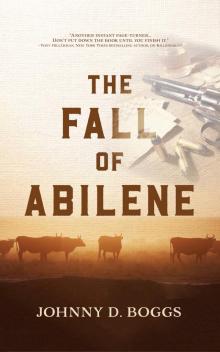 The Fall of Abilene
The Fall of Abilene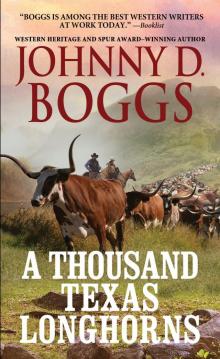 A Thousand Texas Longhorns
A Thousand Texas Longhorns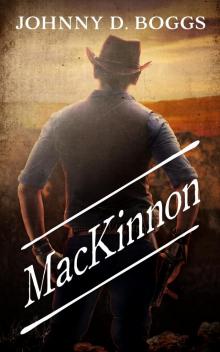 MacKinnon
MacKinnon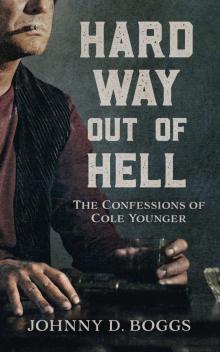 Hard Way Out of Hell
Hard Way Out of Hell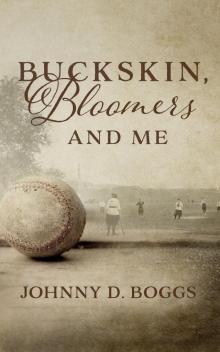 Buckskin, Bloomers, and Me
Buckskin, Bloomers, and Me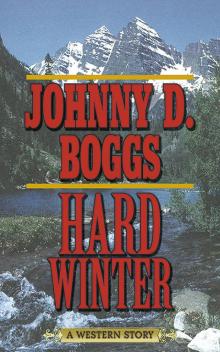 Hard Winter
Hard Winter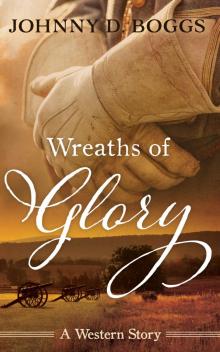 Wreaths of Glory
Wreaths of Glory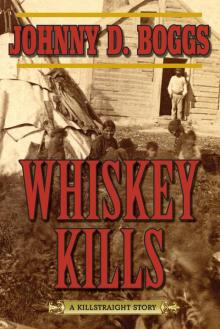 Whiskey Kills
Whiskey Kills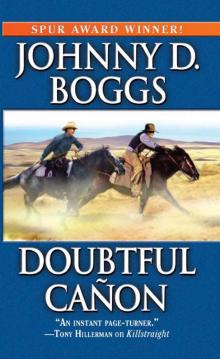 Doubtful Canon
Doubtful Canon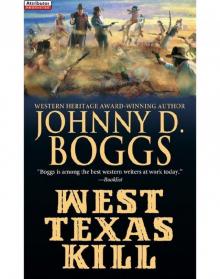 West Texas Kill
West Texas Kill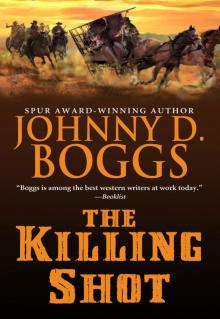 The Killing Shot
The Killing Shot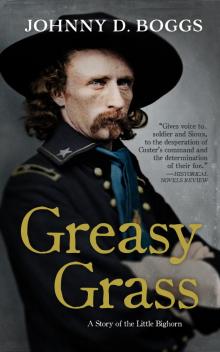 Greasy Grass
Greasy Grass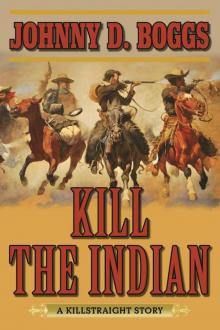 Kill the Indian
Kill the Indian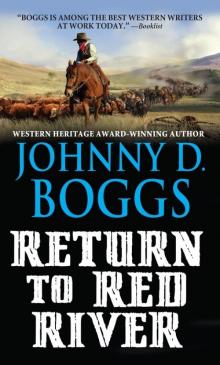 Return to Red River
Return to Red River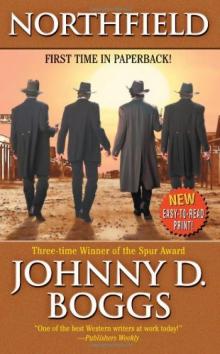 Northfield
Northfield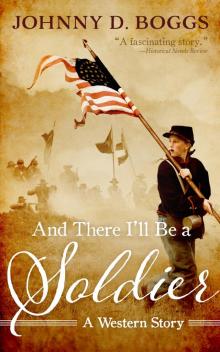 And There I’ll Be a Soldier
And There I’ll Be a Soldier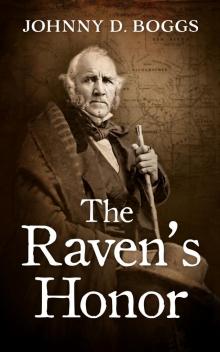 The Raven's Honor
The Raven's Honor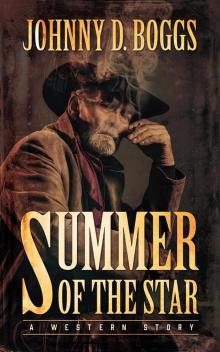 Summer of the Star
Summer of the Star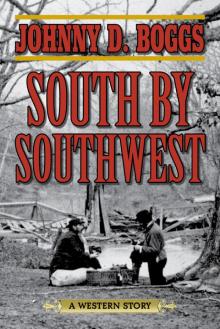 South by Southwest
South by Southwest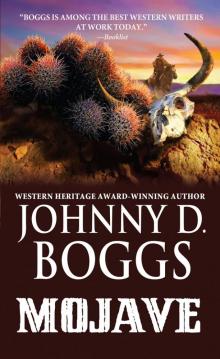 Mojave
Mojave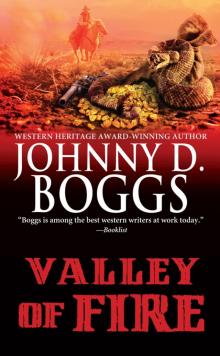 Valley of Fire
Valley of Fire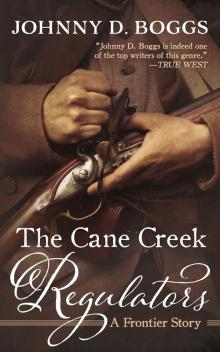 The Cane Creek Regulators
The Cane Creek Regulators